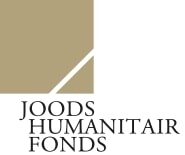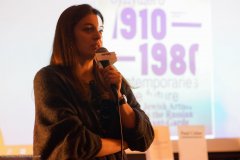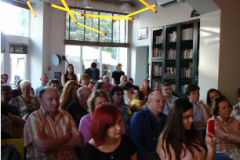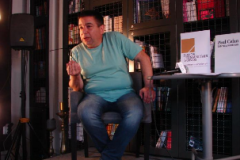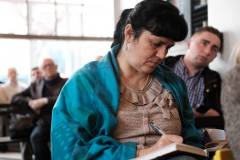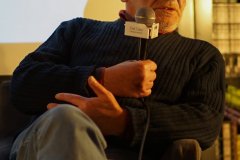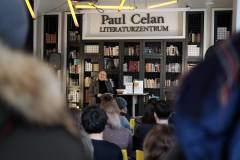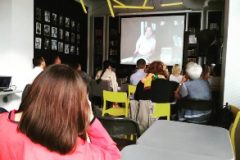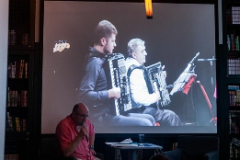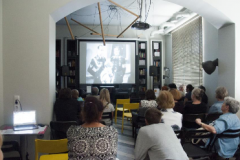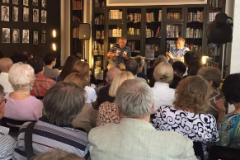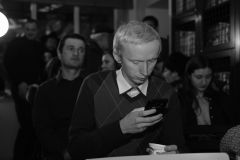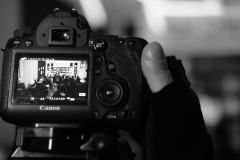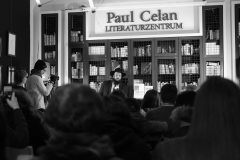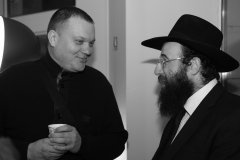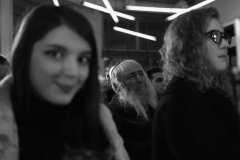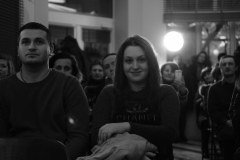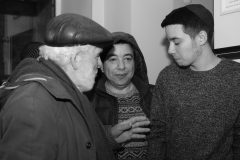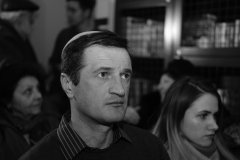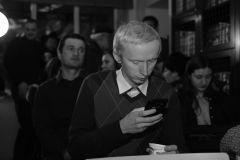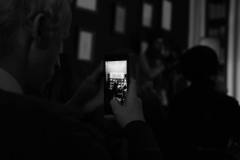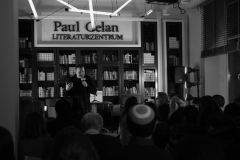
Supported by:
During 11 months in 2018 11 lectures and 12 video lectures took place in Paul Celan Literature Center. These were the lectures by famous professors, activists, translators, essayists, and literary critics, talking on different topics, such as Jewish values through the prism of love, Jewish literature of Bukovina and its Ukrainian perception, features and paradoxes of Jewish identity, an anthology of Jewish humor from the origins to the present, Jewish music, art, and movies; discussing these topics with public, answering questions. Except for offline-lectures, there were 12 video lectures about German-language literature of Bukovina and famous Bukovinian writers like Karl Emil Franzos, Itzik Manger, Georg Drozdovski, Rose Ausländer, Paul Celan, Alfred Gong, Selma Meerbaum-Eisinger, Josef Burg, and Gregor von Rezzori. The events were visited by about 6000 people.
1. Lecture on the topic Anthology of Jewish humor from the origins to the present by Mykhailo Krais
Menachem Mendel Glitsenstein was talking about Jewish love, Jewish cuisine, and why Jews are greedy: „Two weeks ago, a journalist with questions about Jewish life in Chernivtsi approached me. But when I heard those questions, I understood the importance of this lecture. The first question was about Jewish food. We have a different Jewish cuisine, a different culture, it’s interesting and there is nothing weird about it. The second question was about Jewish love. Not the best question, but you can understand it. And the third question was about why Jews are greedy. After that, I realized that people need to explain that the reason is that before we spend money, we think about the usefulness of this money contribution. “
Petro Rykhlo, a Ukrainian Germanist, literary scholar, translator, essayist, scientist: „In Bukovina, Jewish literature was created in parallel in at least three languages: German, Yiddish, and Hebrew. The literature of Bukovina was inspired by the gradual affirmations of the Jewish national consciousness, primarily the ideas of Zionism, only after the Zionist ideas of Theodore Herzl penetrated Bukovina and found distribution primarily among academic youth, we can talk about the outbreak of Jewish nationalism in this region. The beginnings of Jewish literature also occur at the end of the nineteenth century“.
3. Lecture on the topic Features and paradoxes of Jewish identity by Josef Zisels
Josef Zisels, a human rights activist and Ukrainian dissident: „Jews today are no different from other inhabitants of the city. Chernivtsi citizens live among Jews, although there are few of them left. But it’s important to know who lives next to you, what’s the story of them, why they were different from the others before, and today they aren’t different. I want to draw attention to this topic, to show that not everything is so simple in questions of Jewish identity, as we sometimes think. “
4. Lecture on the topic Anthology of Jewish humor from the origins to the present by Mykhailo Krais
Mykhailo Krais, a public activist, representative of the Jewish community of Chernivtsi: „If you study Torah as deeply as I do, then you understand that the Torah is there to call the readers a sense of joy from life. And what, if not laugh and humor, are synonyms of joy? That is, humor is what God created for us. Humor is designed to help us get out of any bad and even terrible situation. This is the only thing that remains in such cases in order not to lose courage so that we could deal with difficult situations with humor.“
5. Lecture on the topic Who are klezmers and their music by Lev Feldman
Lev Feldman was talking about Jewish music, discussing its evolution from the very beginning till now, on his own experience of music teaching and music playing. He had shown the videos of the concerts of his orchestra, discussing the types of Jewish music. Also, the musicians of his orchestra came to the lecture and they all together answered the questions of the audience.
6. Lectures on the topic of Jewish movies by Sviatoslav Bakis
7. Lecture on the topic „How the Jews invented Hollywood“by Sviatoslav Bakis
8. Lecture on the topic „Preminger, Weiler, Wilder, Lubitsch: Hollywood’s Greatest sewers“ by Sviatoslav Bakis
The beginning of September at the Paul Celan Literaturzentrum was marked by three lectures on Jewish cinema by Svyatoslav Bakis. The first of the lectures was also a presentation of the speaker’s book – a selection of articles on Jewish cinema, written in New York and published in Ukraine. The event was moderated by Josef Zisels.
Sviatoslav Bakis during the second lecture: “Speaking of Hollywood, especially its early period, it is worth looking for traces of Jews there. Since 1908, Jewish directors and businessmen have virtually monopolized the machine of the American film industry.
The third event was a lecture „Preminger, Weiler, Lubich: Hollywood’s Greatest sewers“ and a screening of Ernst Lubich’s film „To be or not to be“, a film that is a classic of the comedy genre.
9. Lecture on the topic “Ukrainian pages of life and art of Aharon Appelfeld” by Roman Dzyk
During the lecture, which became one of the events of the IX International Poetry Festival Meridian Czernowitz, the speaker and the audience discussed the biography of Aharon Appelfeld, the importance of his work.
10. Lecture on the topic Ukrainian Jews: demography, sociology, structure and identity by Josef Zisels
During the event, Joseph Zisels‘ research on the demography of Jews, their emigration from Ukraine and other countries to Israel, their identity, Jewish organizations in Ukraine, Jewish education, Jewish museums in Ukraine was presented.
11.Lecture on the topic Jewish art by Bronislav Tutelman
Bronislav Tutelman, a Chernivtsi photographer, spoke about Jewish art, Jewish artists in Chernivtsi and Ukraine. The lecture took place in the format of a conversation between the speaker and the listeners.


